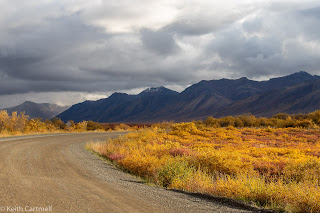The world is a more complicated place than most people believe it to be.
Our brains and bodies are far more complicated than we understand.
capitalism/communism
film/digital
for/against
free/enslaved
in/out
male/female
normal/abnormal
night/day
off/on
open/closed
right/wrong
straight/gay
us/them
black/white (the colours, not an indication of race.)
win/lose
yes/no
These are just some examples of a false binary choice, presented in the way most people would think of the choices. It would have been just as valid to put them the other way around.
Imagine a strip of paper. You have one end in your hand. It's as white as white can be. As your eyes move along the strip you notice a faint grey dot, then another, and another. Maybe it's not a dot, but a complicated shape. Gradually they get bigger, and darker. Then you realized that it isn't black dots, it's white dots, and they're getting smaller and greyer. At the other end the paper is as black as black can be. Somewhere along the way there might or might not be a signature that says M C Escher.
The question is, what colour is the paper?
If you really want to hurt your brain, think about that situation, only on a Mobius strip.
Some people would have you look only at the two ends, and want you to choose between one or the other. They ignore the vast middle of grey. The messy middle of nuance, where the differences between two adjacent points are almost imperceptible.
Even off/on isn't binary. Computers are an example of a device that has states in between on and off, such as sleep, hibernation, and partly on, such as when the monitor might be in use, but the hard drive isn't spinning.
Most of us live in that messy middle, and yet what we hear most about is the two extremes. Why? Because they're loud and all too proud. They have a simple song and they beat the drum hard. Part of the song is about 'them' or the 'other'. There's always a them to be afraid of. A them that is unholy, unethical, unpatriotic, and every other un that you can think of. An other that hates you and wants to take what you have.
There's always a politician willing to find that extreme group, throw them some meat, get out in front of the parade, and claim their minuscule base is representative of the rest of society, and oh by the way, vote for me. Trump did it nearly to perfection in the US, and if he wasn't quite so stupid, greedy, and self centred he might still be president.
Smith here in Alberta is only the most recent such politician. Her ability to leverage from throwing rancid meat to her base that loves it, to being able to put forth moderate and reasonable policies that the messy middle will support seems pretty dubious. I don't think she has any desire whatever to actually do it. I think she's just stirring the pot to get people riled up, because that's what talk show hosts do to drive up their ratings. In fact, I'm not convinced she actually wanted to be premier, she just entered the race to raise her profile.
Enough of that. What I really want to talk about is much more complicated than political governance. It's what happening inside our bodies. As I'm getting older I can feel the changes. The chat around the hot tub is often about various medical episodes. Our bodies are a delicate organism that is so complicated that it's amazing it works at all, and even more amazing that they can take as much abuse as they do. In some ways our bodies are really tough.
But we're still unraveling all the complexity, and still getting better at fixing what goes wrong, or preventing it from going wrong in the first place. We're learning more all the time, and some of what we used to know is all wrong. As agent Kay says, "Five hundred years ago, everybody knew the Earth was flat, and fifteen minutes ago, you knew that humans were alone on this planet. Imagine what you'll know tomorrow." As a digressionary nitpick, educated people 500 years ago knew the world was round, they just disagreed about the size.
Like gender, for instance. Used to be someone looked at a newborn's genitals and said male or female. End of story. And then they were expected to fit themselves into societal roles, often depending on who your parents were or what they did. What you were named, what you wore, who you dated, what you did on your dates, and how old when you did it, what job(s) you took, what you got paid, getting married, having children, raising them to continue the pattern, and grandchildren. All the while, banding together with the other people just like you (or so you thought) to enforce the pattern. "One of us" is often how choices are made.
Except gender more complicated than that, and I'll be right up front in saying that I'm not an expert in this complexity. Just because your body is shaped a particular way doesn't mean your brain matches. Our brain chemistry and our experiences right from the womb all drive how we react to the world. Some of those reactions are better accepted than others.
We still have a concept called normal that describes the acceptable reactions. One example is kids are expected to be able to do various things within various age ranges. Faster than that is advanced, and was usually greatly to be desired. Slower than that, well, things got complicated. When I grew up there were a bunch of names that are no longer acceptable applied to people like that. Back then we sort of understood that a kid might be good at math, and poor at English, and it sort of mostly balanced out for most kids. If you were born to the right parents you would get help at the things you were poor with, or everyone would overlook your shortcomings. Otherwise you struggled with it the rest of your life, and it would certainly affect what career you could choose.
But if you were slow overall, or not as good at speaking or understanding, it was easy to get tagged as abnormal, and then that's what people expected, which became a self-fulfilling prophecy. If the people around you didn't know how to deal with you, or you made too much incoherent noise trying to explain yourself, then you were locked away into an asylum.
Just for being different.
Look back at the list of opposites above and remember that none of these situations exist in isolation. Take male/female and straight/gay. Place those lines at 90 degrees to one another. Map where you think you belong, even if you won't tell anyone else. Just for fun, map where you might be if you've had just the right amount to drink, and you're feeling adventurous and horny.
Now add in another of the opposites, perhaps capitalism/communism at 90 degrees to the others, and now you have a cube to place people in. Then there's all the other mappings, all the other muddling around in the middle, and it doesn't help that our language is freighted with misconceptions and assumptions. If one was so inclined you could plot all these and more into a complicated sphere map, where each radial arm indicated where on a spectrum you were. It's a pretty safe bet that each person's map would be nearly unique.
All these mappings, driven by brain chemistry and experiences, with a few spaces or shapes in there that have been defined or accepted as normal.
Sometimes we can play with the chemistry, giving people anti-depressants, because depression is bad, just as one example. Our doctors and Big Pharma are happy to prescribe pills for every situation under the sun, ostensibly to help someone be 'normal' or pass for it, but mainly to make buckets of money. Sometimes it helps, but all too often there are side effects. There are lots of people that think the cure to become 'normal' is worse than being diagnosed as abnormal and living with that. And all that is before the cynical observation that society wants everyone to be just normal enough to be good worker bees and not rock to the boat so the rich keep on getting richer.
Other times, the diagnosis helps the person find the appropriate responses to the world, or is the key to getting support mechanisms. People get that if your legs aren't working, a wheelchair is one potential solution, and that drives creating ramps to the entrances to public buildings. But they seem to have a harder time with the idea that some people need a quiet space, or no scents around them, or need information presented textually, or any number of other considerations. Somehow, those are considered too difficult, or too expensive, and in some cases, restricting the 'rights' of the 'normal'.
Our society has chosen to define whats normal mainly around what's traditional, convenient, and cheap, leavened with a glug of obsolete religious teachings, though there is a bit of variation about the borders. By choice or chemistry, if you are a bit out of that space, you might be considered weird or an oddball, and eccentric is used if you have lots of money or offsetting gifts that society considers valuable. But the further out of that space you are, the less acceptable you become, unless your other gifts are extraordinary, and even then you probably still won't be invited to the swanky dinner parties. Look up what happened to Alan Turing as a cautionary tale, and that was yesterday, historically speaking.
We need to get better about coping with people outside those old boundaries of normal. Different does not equal evil, or dangerous, or bad. It's just different. Cope with it. Expand your boundaries. Push past the boundaries of what some people say is normal, and embrace the non-binary diversity. You might even learn more about yourself, and find out some non-binary traits that explain who and what you are.
(I normally write a blog draft, do any fact checking I think relevant, do a variable amount of editing depending on a variable number of circumstances, and hit publish. This one, however, I gave a draft to a friend who knows more about these issues than I do. She suggested some changes to clarify my meaning, which helps illustrate why every writer needs an editor. For some people the whole non-binary discussion is a hot button. Any errors or inappropriate wording are mine.)
Of the Day
Driftwood, but it also sort of illustrates some of the points I was making.
Flower
The last Alberta rose in the garden from late October.
Peony
River Reflections, the last one from 40 Mile. There's a few more coming from Tombstone.
Tombstone
Lynx
Film








Awesome piece, Keith. I'm sharing it on my social media accounts! Of the photos, #4 is my favourite. The light and reflections are superb. Once again, my own preference might be a 16:9 crop but that's just me. Thanks for tackling such an important subject.
ReplyDelete